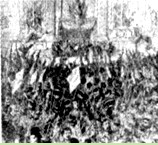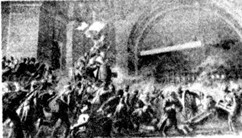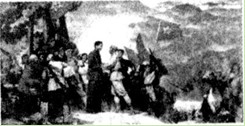Some myths are stories told since ancient times to explain the causes for natural happenings. The Greek myth that explains why there are changes of ___1___ is about Demeter, the goddess of the harvest. She had a daughter, Persephone, whom she loved very much. Hades, god of the underworld, fell in love with Persephone, and he asked Zeus, the ___2___ of the gods, to give Persephone to him as his ___3___. Zeus did not want either to disappoint Hades or to upset Demeter, so he said he would not agree to the marriage, but neither would he ___4___ it. Hades, therefore, decided to take the girl without ___5___. When Persephone was picking flowers in the garden, he seized her and took her to the underworld. When Demeter ___6___ what happened to Persephone, she became so ___7___ that she caused all plants to ___8___ People were in ___9___ of starving. But Demeter was determined not to let crops grow ___10___ her daughter, Persephone, was returned to her. ___11___, still not wanting to disappoint Hades, decided upon a condition for Persephone’s ___12___. She could go back to her mother if she had not ___13___ anything while she was in the underworld. Demeter ___14___ it because she did not know that Persephone had eaten several pomegranate(石榴) seeds in the underworld. When Zeus ___15___ this, he agreed that Persephone could spend part of the year with her ___16___, but he added that since she had eaten the seeds, she must spend part of the year in the underworld. and so it ___17___ that when Persephone is in the underworld, Demeter is sad and therefore ___18___ not let the crops grow. That is ___19___ we have winter when plants do not grow. When Persephone returns, Demeter is ___20___, it is spring, and plants begin to grow again.
1. A. periods B. seasons C. time D. age
2. A. winner B. ruler C. advisor D. fighter
3. A. wife B. lover C. partner D. daughter
4. A. forbid B. forgive C. admit D. accept
5. A. arrangement B. warning C. reason D. permission
6. A. let out B. worked out C. thought out D. found out
7. A. excited B. tired C. angry D. serious
8. A. grow fast B. start growing C. stop growing D. grow slowly
9. A. danger B. hope C. turn D. case
10. A. since B. until C. after D. when
11. A. Persephone B. Zeus C. Demeter D. Hades
12. A. return B. change C. marriage D. journey
13. A. stolen B. found C. eaten D. heard
14. A. understood B. refused C. doubted D. accepted
15. A. discovered B. studied C. forgot D. prepared
16. A. daughter B. mother C. god D. ruler
17. A. works B. remains C. happens D. starts
18. A. should B. can C. dare D. will
19. A. where B. because C. why D. how
20. A. nice B. friendly C. fresh D. happy





